Qassem Soleimani paragon of piety and personification of resistance
Patriotism, piety, courage and resistance are attributes associated with Qassem Soleimani at home. But even Americans and Israelis would, in describing how he was a thorn in their sides, find themselves complimenting him. He was assassinated by America in Iraq on January the 3rd 2020.
Soleimani has been called Master of Iran’s Intrigue by the Americans, and described as a commander who knew how to exploit the secret infrastructure he had established, to fight, to win, to establish presence”, by Tamir Pardo, a former head of Israel’s Mossad intelligence service. Pardo is relating how the fight against Daesh, turned Major-General Soleimani from a shadow figure into a major player in the geopolitics of the region.
The main reason for Soleimani’s overwhelming popularity in Iran and his inspirational legacy across Iran’s borders was his fight against the nightmare terror group Daesh. This is not to say that everyone liked him or every assignment he took on. But he was loved by fellow combatants and revered across the board as a volunteer soldier who evolved into so much more on the battlefield and at home as a person.
We should take a closer look at Qassem Soleimani, the man and his legacy, on the anniversary of his assassination.
A paragon of humility
Soleimani the man can be seen even in his image as a soldier. He is known to have prevented praise by the combatants and the formation of superior-subordinate relationships. In other words, he was an egalitarian while at the same time commanding and winning battles matched against a superpower.
military legacy general Soleimani
Soleimani was martyred along with nine others including Abu Mahdi Al-Muhandis, deputy commander of Hashd Al-Shaabi, the Popular Mobilization Forces (PMF) of Iraq.
And who was it that destroyed ISIS in Syria and Iraq, which the Americans said would last 20 years, in a short time? Well, it is a fact that the people of the world know. But they want to know who was [sic] the creator of this power and what his ideas were. And it is important that Qassem Soleimani is currently at the top of the world news.
Mohammad Kazem Anbarloui, Editor in Chief, Resalat Daily
Became Quds force head through selfless courage
Soleimani, a youngster with no more than a high school diploma, joined the war front during the imposed Iraq-Iran war of the 1980s. He rose quickly in the ranks and in 1998 became the head of Quds Force, the IRGC’s extraterritorial operations arm.
Being an IRGC commander was not cause for popularity, but his selfless courage on the battlefront and his tactical military mind applied to complex geostrategic situations in the field, were.
He didn’t need to study at military universities and colleges. He gained his experience in the field. He had been on the field for 40 years, fighting and gaining experience, and at the same time using his own mental faculties and the inspirations he received.
And so you see in the television footage that a military general, who has reached the rank of lieutenant general, saying his prayers in ordinary clothes.
You see how he draws the operational lines without even carrying a handgun. When you look at American troops and generals, they're armed to the teeth with the most cutting edge weapons and military equipment. He was an ordinary soldier and did not need any decorations. His thoughts and beliefs were his decorations.
Mohammad Kazem Anbarloui, Editor in Chief, Resalat Daily
When Iranian and Iranian-backed forces became major combatants against ISIS in 2014 after the group Daesh had taken over roughly a third of Iraq . The conflict went on till 2017, and was a rare occasion which put Iran and the US together in their fight against Daesh. That is not to say it was an equal fight. Iran was fighting for the safety and stability of its neighborhood, West Asia or the Middle East. But the US was the entity that birthed or supported groups like Daesh and the Taliban, only to fight them partially to keep them in check and rearrange them for future use.
Anyhow three years disgraced by the dirt Daesh spewed on the birthplace of prophets, saw a good strategic partnership form against a common foe between sworn enemies.
On a number of occasions, the Americans were hitting Daesh targets from the air while General Soleimani was simultaneously directing the Quds force and PMF ground forces against them.
Soleimani was a natural-born leader who was always prepared to fight for a cause, and grouped people to go along with him. He was instrumental in preventing Iraq from completely falling to Daesh, fighting with the Qods force and Iranian-backed Iraqi militia forces as well as regular military forces.
Kurdish leaders have been cited saying that when Daesh took Mosul [in 2014] and was about to head for Erbil, there was no American or Turkish support in sight for the Kurdish forces.
But in just 2 hours, Soleimani arrived in Erbil with two large planes of military supplies. His presence alone was a battle-shipment; he shored up the front-line Peshmerga soldiers, to protect Erbil and Kirkuk from the Daesh onslaught. And protected they were.
Qassem Soleimani used the death of Jalal Talabani in such an appropriate way to create unity in the Kurdish society. His visits to such areas always carried an immense amount of risks. But as you know, he went there and offered his condolences to Talabani’s family and even paid a visit to his grave. With this behavior, the emotional relationship, and the diplomatic and political dialogue, he prevented great bloodshed in this region. And the Kurdish region remained as part of Iraq.
Brigadier General Ramezan Sharif, IRGC Spokesperson
Also in the south of Iraq, where that country’s forces had collapsed with Daesh at the gates in Baghdad and Najaf, Soleimani organized Shia militias with a fatwa, a religious edict, by Ayatollah Sistani, and carried out his command by successfuly pushing back Daesh in short order.
Otherwise America would have met with a very different scene in Iraq, when in 2003 it invaded that country to oust its Baathist President Saddam Hussain. In ousting Saddam, America pushed Iran away from itself yet further.
In the southern part of Iraq, you can almost see the same situation. But when you look at it, on the Iraq issue, Saudi Arabia was one of the countries experiencing the worst failures. This is the result of Hajj Qasim's strategy in employing and paying attention to all tribal sheiks in Iraq and not just Shiites. When you look at his discourse, relations, and behaviors, they have pervaded all Iraqi societies. Such behaviors ruled out a conflict with the Kurds in southern Iraq. That is, Hajj Qasim's behavior throughout his life has been a unifying factor.
Brigadier General Ramezan Sharif, IRGC Spokesperson
Quiet charisma and pragmatism his winning traits
With the 2003 invasion, Iran’s allegations of US meddling in other state’s affairs were yet again shown to be justified. And as the United States sought to negotiate a deal for Iraq to allow American forces to stay in the country past a 2011 deadline, General Soleimani pushed Iraqi officials to refuse to sign… His quiet charisma and pragmatism were winning traits in convincing various diverse parties and rallying their support.
Even American officials have been known to communicate with General Soleimani to ease tensions in Iraq.
You see, if you remember, during the invasion of Iraq, the United States disarmed all Iraq’s artillery and missiles, bought off all the military leaders of the Ba’ath Party, and then carried out its attack. The policy of the United States and Europe in conquering governments and territories is to buy off and deceive their leaders in negotiations, either through offering bribes or issuing threats.
He was the one who closed the door to dialogue with the United States, but that’s not to say that he did it every instance.
We have had interactions in Afghanistan and even in Iraq. But he had shut the door to negotiations with the intent to buy him off.
Mohammad Kazem Anbarloui, Editor in Chief, Resalat Daily
Military genius shattered the Israeli image of invincibility
Soleimani was the military genius who shattered the Israeli image of invincibility during the 33-day-long War of Tammuz in 2006 between the Lebanese Resistance Movement, Hezbollah, and Israel.
The war was part of George W. Bush’s plan to destroy the resistance in Palestine and Lebanon, and topple the government in Syria after having invaded Afghanistan and Iraq.
It was all part of a broader plan intended to finally isolate and besiege Iran. Qassem Soleimani went to Beirut in the early days of the Israeli attack on Lebanon. He did so to organize the resistance forces and coordinate combat operations.
Now, the world’s strategists are assessing who was he who prevented Syria’s Bashar Assad from being toppled, even when the whole world had gathered to do so?
More importantly, they want to know who was he who somehow participated in commanding and managing the wars in Lebanon and Gaza.
While Israel defeated the armies of 4 or 5 Arab countries in 1967, how did he manage to come out as the victor in subsequent wars against the regime, to the point that Israel is now besieged by Lebanon and Gaza?
Who was it that changed Lebanon’s Hezbollah position from being a deterrent to a group that takes preventive action?
Mohammad Kazem Anbarloui, Editor in Chief, Resalat Daily
Thanks to Soleimani and the troops he commanded or joined forces with, Daesh was defeated in both Iraq and most parts of Syria.
Separated the real resistance from the mercenaries
A less popular fight worldwide, however, was that in support of the Syrian Government. But it has been successful all the same.
From the very beginning, he identified and strengthened the cores of resistance in the region. He separated the real resistance from mercenaries, connected them, and turned them into rings of resistance.
He then intertwined these rings to form a chain of resistance that stretched from the Mediterranean Sea to East Asia, from Afghanistan, Yemen, and Lebanon, to Palestine and Syria. And then this chain of resistance became the resistance front.
With his martyrdom, the Americans thought the work was over and the chain would be broken. But we went one step further, in the sense that his martyrdom created a popular social movement of resistance in the region, not only between Muslims and Shiites, Sunnis, Kurds, Arabs, Persians, and Afghans.
Many freedom seekers around the world realized that they can stand against the Zionist regime and the United States by the means of Resistance.
Hossein Kanani Moghadam, Secretary, International Anti-Zionism Association
Without strategy and pragmatism, a fight against the likes of Daesh would have been futile. Fighting Daesh has several facets such as being on the front lines with Iraqi and Syrian fighters, regular and accurate command in the fight against DAESH, dealing with foreign powers and good and coordinated cooperation with Iraqi, Syrian or Russian commanders in the fight against Daesh, while foiling US plans In transferring Daesh forces to operational areas by identifying the front lines.
Assassinated as distraction from Donald Trump’s impeachment
This raises the question; did the US assassinate Solemani and company just as a distraction from Donald Trump’s impeachment?
General Suleimani and other leaders of his generation were shaped by the 8-year war Iraq inflicted on Iran with US and world support, in seeing Iran weak in its new-founded revolutionary state.
It wasn’t as weak as they thought; far from it. Iran has a standing army traditionally, and volunteers as well as the forces who rushed in defense as they saw their borders breached.
Devastation caused akin to World War I
But the conflict from the Iraqi side was so cruel, with trench warfare and chemical weapons, that the devastation caused has been compared to World War I. Nearly a million people died on both sides.
From a historical standpoint, we saw a young man in his twenties joining the IRGC early in the war between Iran and Iraq, who soon was promoted to command a division. You know, to command an army, one has to go through all the ranks, from being a trooper all the way to the top. But in his case, a young man came in the midst of a tough military battle and became the commander of a division. This was only the beginning of his career. After the war ended, he didn’t lay down his weapon. In the Quds Force, he commanded several multinational divisions.
Mohammad Kazem Anbarloui, Editor in Chief, Resalat Daily
A man for all seasons
General Soleimani spent much of that US-backed war on the front lines, determined with his comrades, to see the war through, as a “never again” moment.
Soleimani was a military tactician and diplomatic strategist who knew how to rally both military leaders and presidents. So as he departed right after New Year in 2020, he left behind a legacy and will to oust US forces from this region.
In fact On January 5, the parliament of Iraq voted to expel U.S. military forces from Iraq, with parliamentarians chanting “Yes, Yes Soleimani”...
Although this decision may not actually have changed the status of U.S. forces, yet!
Iran avenged the Soleimani assassination on 8th January, a day after his funeral procession, launching a major missile attack on the Ain-al-Assad base where US troops were stationed.
The Golf Course
Would it not be vengeance enough that Donald Trump was not reelected to do more harm?
It was Trump who reportedly mulled over the idea of removing Soleimani over a game of golf, having been motivated by his foreign Secretary Pompeo’s speculations. Pompeo is known as the Trump Whisperer.
As the first slap in the face of the US in the first round of measures to avenge General Soleimani, which was Iran’s airstrike on the US strategic base of Ain Al-Asad with precision-guided ballistic missiles, at least 110 people were killed. But the Americans said they were having mere concussions. The Americans are still trying to prevent words from getting out, and won’t allow anyone to say that it was anything more than concussions. This revenge will not necessarily be limited to a specific method and model. This revenge will be designed and implemented on several layers. This revenge that will prove bitter for the other side will bring more peace, stability, and security to the region.
Amir Abdollahian, Special Advisor on International Affairs to Speaker of Parliament
The altruism of Haj Qassem, the man
Soleimani’s evolution from soldier to legendary general is self-evident, but what about his moral and personal growth?
Even inside the country, you see Qasim as independent and beyond any political orientations. This is because of his deep worldview. You must’ve heard his speech in which he called on politicians not to divide the country. He said either principlist or reformist, with or without hijab; we’re all Iranians and children of this country.
Brigadier General Ramezan Sharif, IRGC Spokesperson
A staunch revolutionary, he did embrace in recent years, the idea of all women with or without hijab to be as good as any sister or daughter to him; to be equal fellow-countrywomen in other words. That is not any woman is waiting for approval of her being, but Soleimani did and does matter in the system and as a soldier-protector.
“There’s no difference between my children and anyone else’s.”
When his twin grand-children were born a couple of years before his death, the mother of a stronger child agreed willingly to give up the isolation room to the twins. But Soleimani seriously protested: “You pulled a sick newborn out for my grandkids? There’s no difference between my children and anyone else’s. Please return the baby. We will wait our turn for an empty room.”
He was one of the commanders who are not egotistical. He never sought any attention in any missions he was assigned, whether it ended in victory or defeat. Another characteristic he had was that he didn’t act as a superior to any of his forces who fought on different fronts, whether Afghan, Iraqi, Lebanese, Palestinian, Syrian, Christian, Muslim, Zoroastrian, Yazidi, Shiite or Sunni. His behavior wasn’t affected by any ethnic or tribal, considerations.
Hossein Kanani Moghadam, Secretary, International Anti-Zionism Association
Main reason for this successful defense
Such is the legacy of a man who was present in all fronts, both external battlefields and internal natural disaster sites such as flood-stricken areas. He was present for two thirds of his 62 years on this earth, until a single instant and a US drone-strike outside a Baghdad airport, targeting his car.
This very culture [of martyrdom] is the main reason for this successful defense in various stages today. The same culture brought us victory
during the Sacred Defense(The Iraq-Iran war of 1980s). From the beginning of the Islamic Revolution to this day the resort to this culture developed by Imam Hussein has gained us and guaranteed all our victories in all stages. We pray to God to help us follow(the way of) Imam Hussein and remain as pure and honest as his disciples on this path.
General Qassem Soleimani
His funeral matched his legacy; his open coffin, together with those of his companion’s, toured Baghdad before takeoff for Iran. Once in Iran, it went from Ahvaz to Tehran, Qom and Mashad before being laid to rest in Kerman, where he grew up. Processions were in their millions and were not limited to Iran.
Ceremonies were held to honor the man, from India, Pakistan, Yemen to all over the region, and in Europe and even Latin America too. Who was this man? This man had a political and religious discourse and, according to the Leader, had his own school (of thought). Now, if we want to know what Soleimani's school says, the clearest and most well-founded document is his published will. In his will, he explained line by line his beliefs and how he reached this level. And over the past year, tapes of his speeches and lectures have gradually become available.
Mohammad Kazem Anbarloui, Editor in Chief, Resalat Daily
Iran Armed Forces shoot down US F-15 fighter jet near Kuwait border
IRGC, Army launch fresh waves of missile strikes against Israeli, US targets
Red Crescent Society: 555 people killed across Iran in US-Israeli onslaughts
Operational concerns delayed US-Israeli aggression against Iran for a week: Report
Iran slams Israeli attacks on Lebanon, warn UNSC’s inaction to embolden regime
Iran says has ‘no choice’ but to fight back, holds no enmity toward American people
Bahraini police assaults crowds mourning loss of Ayatollah Khamenei
Iran posed no imminent threat to US: Pentagon tells Congress










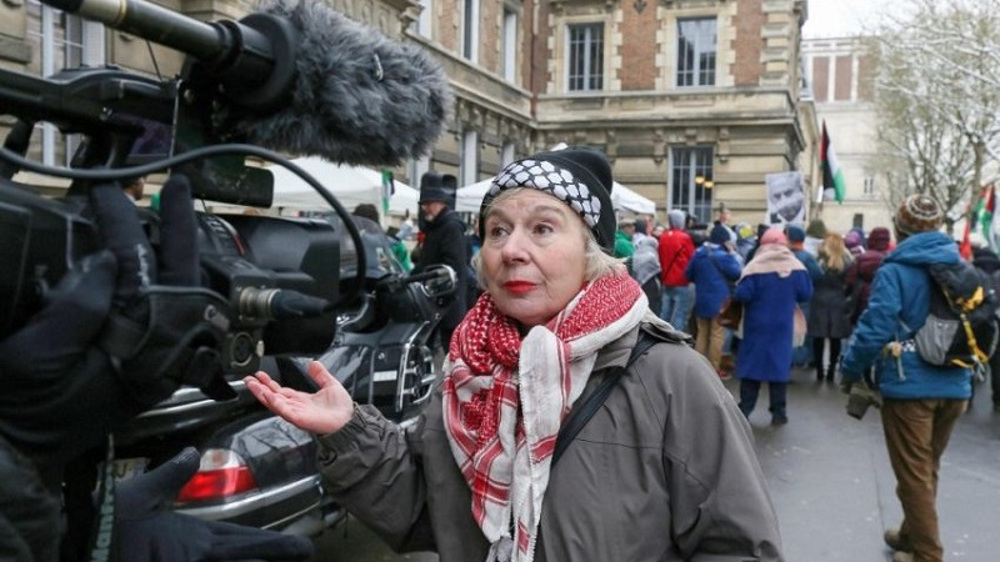
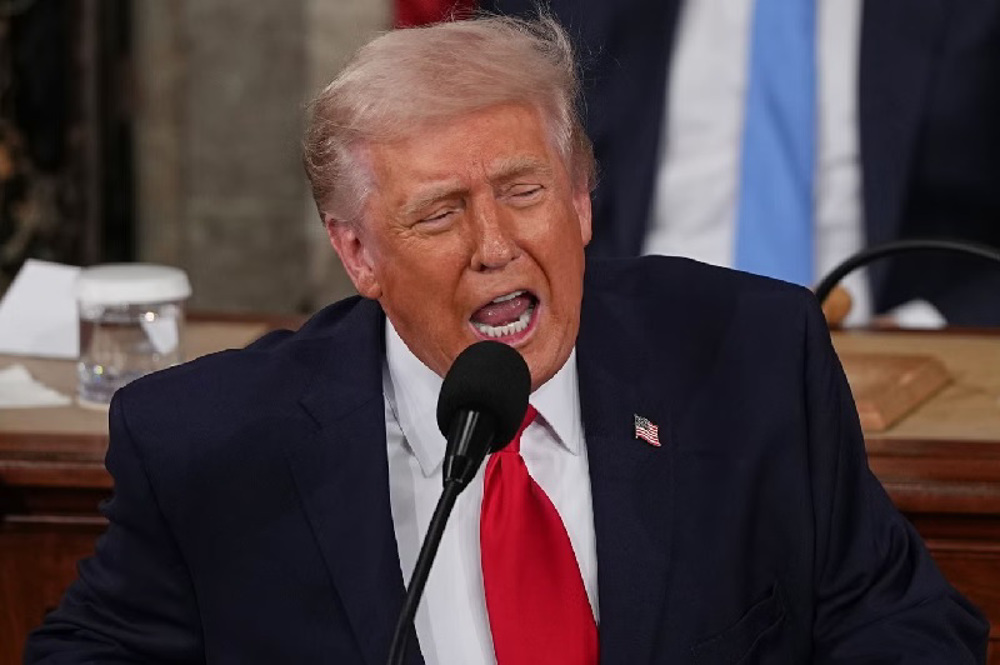
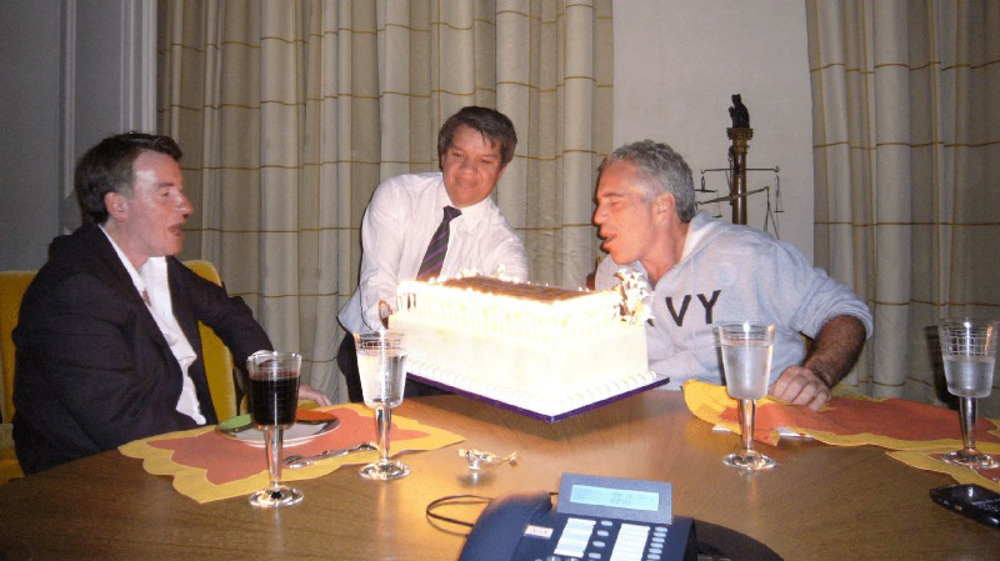




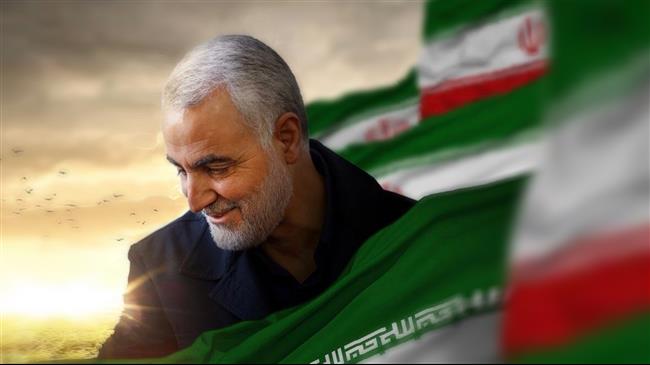

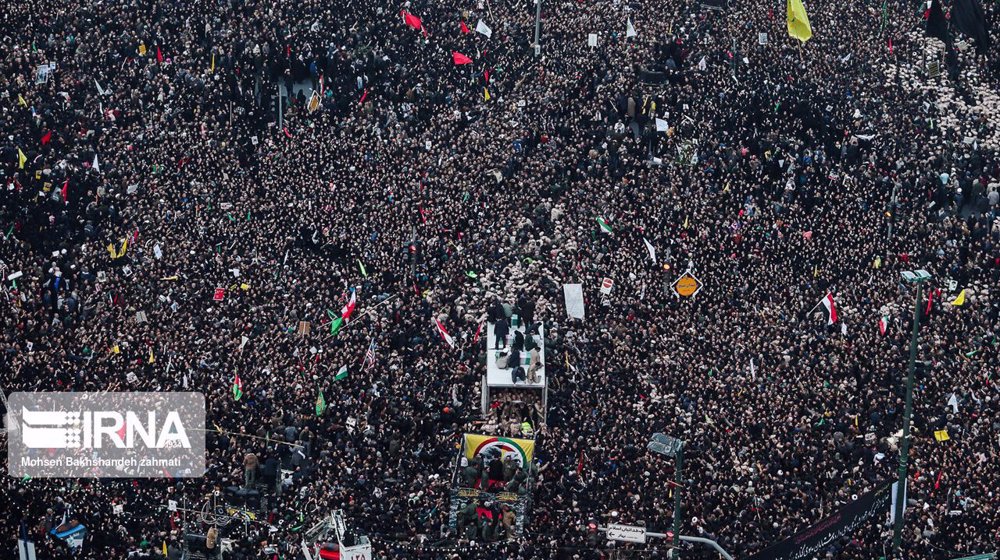




 This makes it easy to access the Press TV website
This makes it easy to access the Press TV website